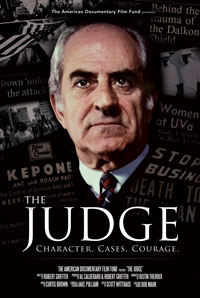Legacy
 The Judge – Character, Cases, Courage,is a feature length documentary film centered on Judge Robert R. Merhige, Jr.’s tenure on the United States District Court for the Eastern District of Virginia, in Richmond.
The Judge – Character, Cases, Courage,is a feature length documentary film centered on Judge Robert R. Merhige, Jr.’s tenure on the United States District Court for the Eastern District of Virginia, in Richmond.
Immediately following his appointment to the U.S. District Court by President Lyndon Johnson in 1967, Judge Merhige was handed a full docket of landmark cases. Thus he embarked on what can be conservatively described as an extremely momentous tenure on the Eastern District bench.
In his first week on the job the Judge was called back to Richmond from a training session in Norfolk, Virginia to preside over a motion for a writ of habeas corpus brought by radical civil rights attorney William Kunstler on behalf of his client, H. Rap Brown. Brown, a prominent civil rights activist and chairman of the Student Nonviolent Coordinating Committee (aka SNCC), was being held in custody by the U.S. Government, but had not been formally charged with a crime. The Judge ruled that if the U.S. Attorney was not ready to charge Brown with a crime he must be released. The Government was not ready to charge Brown but did not want him released. However, much to the Government’s chagrin, Judge Merhige ordered Brown’s immediate release. Thus began Judge Merhige’s journey through the tumultuous history of the 1960’s, 70’s and 80’s — an era which mirrors the troubled times we are living through today.
Following that baptism of fire, the Judge went on to rule on cases relating to school busing in order to bring about the desegregation of public schools in Richmond, Virginia, the former Capital of the Confederacy.
The public’s vehement resistance to the Judge’s “liberal” rulings implementing the will of the U.S. Supreme Court mandating school desegregation led to a violent backlash. That backlash required 24 hour protection for the Judge and his family by the U.S. Marshals Service. During that period the Judge’s life was threatened, the lives of his family were threatened, his home was picketed, his guest house was burned to the ground, his dog was shot, he was hung in effigy, and he was spit on while out in public. Through it all the Judge persevered, did his job, did what he felt was right and fair, and worked to promote racial equality. It was a very tough row to hoe.
He went on to preside over many high-profile cases of great national significance, including Allied Chemical’s dumping of deadly Kepone into the James River, one of the worst environmental disaster cases in the nation’s history. The Dalkon Shield was a defective intra uterine contraceptive device that maimed thousands of women. The Judge’s rulings in both cases became models for the settlement of such cases, and these models are still employed today.
Throughout the course of U.S. history, extraordinary times have seen the rise of extraordinary people, and at a time of great social change in the U.S. Judge Merhige emerged as one of those people. As a result of the number of historically significant cases over which Judge Merhige presided during his nearly 31 years of service on the federal bench, Judge Merhige attracted attention as “The Nation’s Go To Judge”. As a result of his courageous stands and landmark rulings he was revered by many and reviled by some. However, Judge Merhige’s absolute love for the law, great personal courage and unfailing fair mindedness saw him through some very trying times and allowed him to do what he simply referred to as “his job.” He was a man who believed in the “Magic of America,” as depicted in Frank Capra’s movies of the 1930’s and the 1940’s.

